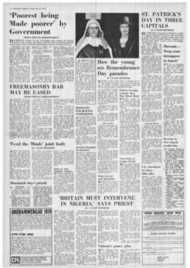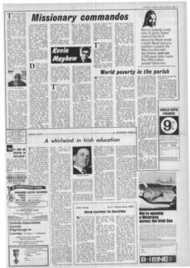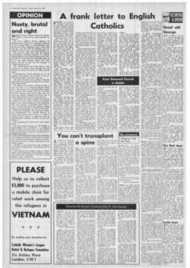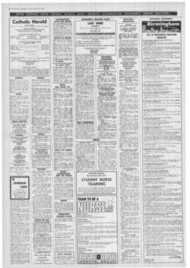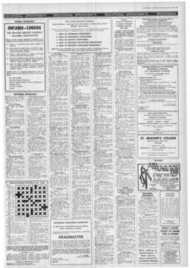Page 3, 22nd March 1968
Page 3

Report an error
Noticed an error on this page?If you've noticed an error in this article please click here to report it.
Tags
Share
Related articles
Last Year Pakistan's Christian Community Suffered Its...
Young Enthusiasts Help At Glencree Centre
Suit; Of Armour Replace The Combat Jackets
Lamb Chops, Wild Salmon And Soaring Cliffs Of Erin
Guard Against Trouble At Irish Shrines
A whirlwind in Irish education
THE ABRUPTNESS of the radio newsreader was out of tune with the lazy Sunday we had behind us, with the cars droning past the house towards the Wicklow Mountains, lured out by an early spring sun. Later I realised that he had begun without the usual introduction: "This is the news, read by So-and-So." He began: "Mr. Donogh O'Malley, the Minister for Education . . ."
"Donogh O'Malley" — and first news item. So O'Malley had done it again! What now? My imagination raced to finish. the sentence: "the National Museum to move to Galway," "Irish to be an
optional subject in the schools," "a university for Limerick," "Trinity College to be dissolved."
Anticipating him was becoming a more difficult game as he used up the remoter possibilities. In one year he had introduced free post-primary education, sent "O'Malley's buses" in their hundreds to pick up schoolchildren from Kerry to Donegal, announced the merger of Trinity College with University College, Dublin, and the dissolution of the National University, abolished the Primary Certificate examination, put a dozen committees to work on curriculum reform, projected seven new technological colleges, set in motion the reform of the National College of Art and the transfer of the Department of Education from Dublin to Athlone.
Handsome, charming and tough, he had swept like a whirlwind through the placid waters of Irish education, making everything seem possible, and in the process lifting his ministry with him out of junior status in the Cabinet to the most dynamic centre of Government activity.
Wherever there was youth or imagination in the country, people looked to hitn, admired his style, felt liberated by his reckless indiscretion, laughed at his sallies. He was to go to New York for a few days to lead the Limerickmen in the St. Patrick's Day parade on Fifth Avenue.
Continuing, the newsreader told us that he had died at the age of 47. He had taken ill that morning after speaking at a by-election meeting at Sixmilebridge, Co. Clare, and had been taken to St. John's Hospital in his native Limerick where he had died a few hours later. That evening his wife and daughter returned from Rome—he was to have met them at Shannon Airport.
It was only as the shock his death gave us recalled another shock that we knew what he had meant to us, by hindsight. My wife and I said "Kennedy —like when he died." and in the next two days the comparison had become commonplace, though no one had ever compared him to Kennedy before. Some said "a Michael Collins."
On the radio next morning the reporter who gives a survey of the morning's newspapers departed from his severely objective tone to say that, although all the papers carried long obituaries, the real obituaries had already been spoken the day before "on the streets and in the buses and at firesides."
We began to witness one of those rare and beautiful, because so spontaneous, instances of a democracy expressing its will generously and directly,
without regard to legal forms or protocol, and having it implemented in the highest places. When I saw O'Connell Street at ten o'clock on Monday morning, one shop had a flag up at half-mast.
By the afternoon, Tricolours at half-mast were fluttering all along the street. All by-election meetings were called off and the parties agreed—it was without precedent—that there would be no meeting of the Dail. Inevitably, a State funeral was decreed.
Besides the schoolchildren lining the funeral route, sportsmen, nurses and religious nursing sisters were much in evidence. He had been a leading swimmer and rugby player and a patron of soccer football. As Minister for Health, he brought rapid movement and reforms to bear, among other things, in nursing conditions. But it was after becoming Minister for Education in July 1966 that he really found himself as a man and as a statesman.
Of course, in education he had a propitious field waiting for him to make his mark. During the long climb upwards from the hedge-schools, schooling facilities and opportunities have been very near the centre of Irish Catholic feeling and aspirations.
People are still near enough to that long struggle to be stirred deeply when new educational doors and horizons are thrown open. Hitherto the desire for schooling has always outreached what might seem to be economic possibilities: even before free secondary schooling was introduced, the proportion of children going on to secondary school was greater than in Britain.
When O'Malley, with the new funds at his disposal which prosperity had made available, threw himself with verve and élan into the first major overhaul of education since the foundation of the State, he was assured of a place in the people's hearts and in Irish history. Ar dheis De go raibh oi =am! (May his soul be at the right hand of God!).
blog comments powered by Disqus



